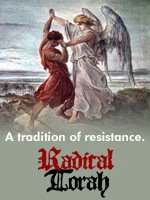halfway up the mountain
 Thoughtful and provocative new webl, Radical Torah: Sources for the Jewish Social Action Community,
"features multiple takes on parshat hashavua (the weekly Torah portion), as seen through the lens of progressive religious and political viewpoints. The project seeks to create a resource of authentically Jewish responses to pertinent social justice issues, timed in accordance with their relevancy to the Jewish calendar."
Thoughtful and provocative new webl, Radical Torah: Sources for the Jewish Social Action Community,
"features multiple takes on parshat hashavua (the weekly Torah portion), as seen through the lens of progressive religious and political viewpoints. The project seeks to create a resource of authentically Jewish responses to pertinent social justice issues, timed in accordance with their relevancy to the Jewish calendar."From this week's parashah, Mishpatim, Danya Ruttenberg writes "Beyond Mysticism":
"...Right after the vision of God, Moses continues up the mountain, leaving his friends behind...He ascended higher up the mountain. Into a place not about visions, but about commandments. Into a place not about experiences, but rather, covenant. Moses, here, accepts his (and Israel's) half of the responsibility for a relationship with the Divine. It's not about getting something cool (theophany, mysticism) but rather agreeing to give something...Moses, after all, didn't just see God, he spoke to God "panim al panim," face to face. He didn't just have an experience of God, he had a relationship with God. And while theophany is fleeting, sometimes hard to control, a relationship is something more stable, lasting, and accessible at all times. Mystical experience is great, but it's only halfway up the mountain. Perhaps every now and again it's worth asking ourselves what we might be able to offer God, instead."